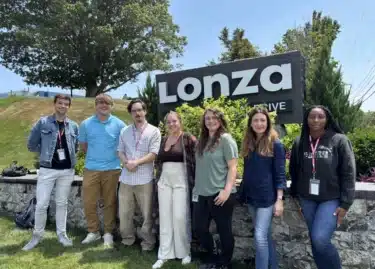
In this season of graduations, many high school students across New Hampshire are celebrating dual degrees by earning both a high school diploma and an associate degree from one of New Hampshire’s seven community colleges. Through its Early College program, the Community College System of New Hampshire (CCSNH) provides opportunities for high school students to earn dual credit and explore diverse subject areas at low or no cost to New Hampshire families.
The Early College program offers three modalities for high school students – enrolling in their high school, at a community college campus, or 100% online. Courses enable students to get a jump start on their future by earning concurrent high school and college credit that is transferable to most colleges and universities or will help them accelerate their career by entering the workforce with an advantage. Through the Dual and Concurrent Enrollment Scholarship program, eligible New Hampshire students in 10th, 11th and 12th grade get two free courses per year and a discounted rate for additional courses.
Students who graduated with dual degrees this spring personify the broad range of benefits realized through Early College.
Cora Shaklee participated in Early College at Nashua Community College to take advanced math classes and obtain general studies credits to fulfill core requirements at Plymouth State University. She is looking forward to bypassing entry level classes to focus her studies on math and meteorology.
Niko Galus had planned to participate in Early College since she was in middle school. “It was always in my family’s mind that it was something that I would do. It would give me a jump start on everything,” she explained. Niko also felt that Early College would create a glide ramp to the transition from homeschooling to college. She attended courses on campus at NHTI-Concord’s Community College, enabling her to ease into a college environment even as she continued to homeschool.
Valerie Robinson discovered that Early College gave her a competitive edge to achieve her career goals. At just 17, Valerie has a high school diploma, an associate degree from NHTI – Concord’s Community College in Criminal Justice, and an eight-year contract with the National Guard to serve in the military police (MP). She said that having her associate degree was a key to being selected for the MP program. “Employers and co-workers at every job I have applied for have been amazed that I am a college student at my age. It shows I have the education they want, but also that I am dedicated and motivated.”
Liane Demers began Early College online before enrolling on-campus at Manchester Community College (MCC). This May, she received her homeschool high school diploma and associate degree in Business Studies from MCC. By fast-tracking her academic programs, Liane cleared the way to pursue her passion for dance. She will attend the Boston Dance Theater Trainee program this fall to lay the groundwork for a career as a professional dancer. “Because of my schooling and how ahead I am, I can take time to explore dance opportunities,” she explained.
Jules Marquis needed additional challenges when he completed the high school coursework required for a diploma at an early age. The Early College program enabled him to take classes at Lakes Region Community College and graduate with his associate degree in Computer Information Systems before most of his peers had received their high school diplomas. He relishes learning in a wide range of fields and plans to pursue a bachelor’s degree in Finance at Plymouth State University this fall.
According to Shawna Young, director of secondary education partnerships for CCSNH, 90% of students taking college courses through the CCSNH Early College program do so by attending courses at their high school, using a college syllabus with courses taught by educators credentialled for college teaching. More than 100 New Hampshire high schools participate in the programs.
Nikko Koukis began his higher education journey with Early College classes at Portsmouth High School. He graduated from Great Bay Community College in May and will transfer his credits to University of New Hampshire, where he plans to receive a bachelor’s degree. He said that Early College courses enabled him to “take a whole year off my college education.” He also pointed out the significant financial advantages of taking college courses in high school when they are often covered through the Early College program. “Early College not only gives you a head start academically, but it’s also more affordable,” he said.
Katiana Berry took online courses at Nashua Community College during her senior year at Campbell High School, earning her associate teacher certificate in Early Childhood Education in just one year. Credits counted toward both her certificate and high school graduation requirements. Katiana feels that her associate teacher certificate will enable her to provide the best care possible for children and qualify her for higher pay when she joins the childcare workforce after her high school graduation.
From 2022 to 2025, Early College enrollment in NH increased 25% to a total of 10,863 students in the 2024-2025 academic year. The number of credits earned by Early College students increased 28% between 2022 to 2025, with a record of 59,840 posted for 2025.
For more information, visit CCSNH.edu/EarlyCollege.



